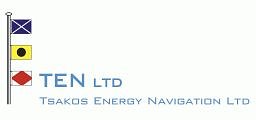
Beyond the Bottom Line: Tsakos Energy Navigation Invests in a Future for Maritime Leadership
Dr. Nikolas Tsakos’s award isn’t just for shipping success. It recognizes a deep commitment to education, workforce development, and preserving Hellenic legacy within a vital global industry.
Beyond the Bottom Line: Tsakos Energy Navigation Invests in a Future for Maritime Leadership
By Angela Gray
New York, NY – October 31, 2025 – Dr. Nikolas P. Tsakos, CEO of Tsakos Energy Navigation (TEN), recently received a prestigious award at the annual Chrysanthemum Ball Gala, honoring his contributions to the global maritime industry and philanthropic endeavors. While accolades for business success are common, this recognition goes deeper – acknowledging a sustained, strategic investment in the future of maritime leadership through the Maria Tsakos Public Benefit Foundation.
TEN, a publicly traded shipping company boasting a fleet of 82 vessels, has long been a prominent player in the tanker and LNG carrier markets. But beyond the balance sheets and operational efficiency, a less-publicized narrative is unfolding – one centered on workforce development, cultural preservation, and a commitment to social responsibility that extends far beyond typical corporate philanthropy.
A Family Legacy of Giving
The foundation, established in 2010 in honor of Dr. Tsakos’s late wife, Maria P. Tsakos, isn’t a mere check-writing exercise. It's a deliberate effort to address critical challenges facing the maritime industry – namely, a growing skills gap and the need for a more robust and diversified talent pipeline. "The industry often focuses on the present, but forgets the next generation," a source familiar with the foundation’s operations noted. “Dr. Tsakos recognized that a proactive approach to education was essential for long-term sustainability.”
This proactive approach materialized first with the launch of the Tsakos Enhanced Education Nautical School in 2018, and more recently with the inauguration of the Tsakos Merchant Marine Academy in 2024 – both located on the Greek island of Chios. These aren't typical vocational schools. They represent a unique model of maritime education, combining rigorous academic training with hands-on seamanship and a strong emphasis on environmental stewardship.
Addressing the Skills Gap
The maritime industry is facing a mounting shortage of qualified seafarers, exacerbated by an aging workforce and the increasing complexity of modern vessels. “The skills required today are vastly different than they were even a decade ago,” explains a maritime education consultant. “There’s a need for professionals with not only technical expertise but also digital literacy, problem-solving skills, and a commitment to sustainable practices.”
The Tsakos schools directly address this need by offering a comprehensive curriculum that integrates traditional seamanship with cutting-edge technologies. The academies are also heavily invested in simulator training, allowing students to gain practical experience in a safe and controlled environment. The foundation has, to date, provided funding and support for over 500 students, hailing from Greece, South America, and Africa – contributing to a more diverse and inclusive maritime workforce.
More Than Just Workforce Development
Beyond workforce development, the foundation’s work is deeply rooted in preserving Hellenic heritage and strengthening the connection between the Greek diaspora and the maritime industry. Chios, with its rich seafaring history, was intentionally chosen as the location for the academies. “There’s a strong sense of tradition and maritime culture on the island,” said a local resident. “The Tsakos schools are breathing new life into that legacy.”
The foundation’s commitment extends beyond education to include community engagement and support for local initiatives. This holistic approach reflects a genuine desire to create a positive impact on the lives of those living and working in the maritime sector.
A Model for Corporate Social Responsibility?
TEN’s approach to corporate social responsibility goes beyond simply donating funds to charitable causes. It’s a strategic investment in the future of the industry, driven by a long-term vision and a commitment to sustainable practices. “Many companies talk about CSR, but few truly walk the walk,” a financial analyst commented. “TEN is demonstrating that it’s possible to be both profitable and socially responsible.”
This model isn’t without its challenges. Establishing and maintaining high-quality educational institutions requires significant resources and ongoing commitment. Furthermore, attracting and retaining qualified instructors is crucial for ensuring the success of the programs.
However, the early results are promising. The Tsakos schools are attracting top students and producing graduates who are well-prepared to meet the demands of the modern maritime industry. The foundation’s work is also inspiring other organizations to invest in maritime education and workforce development.
Looking Ahead
The Chrysanthemum Ball Gala wasn’t just a celebration of Dr. Tsakos’s achievements; it was a recognition of a broader trend – the growing importance of corporate social responsibility and the need for businesses to invest in the future.
As the maritime industry continues to evolve, companies like TEN that prioritize education, workforce development, and sustainability will be best positioned to thrive. The legacy of Dr. Tsakos and the Maria Tsakos Public Benefit Foundation serves as a powerful reminder that true success isn’t just about profits; it’s about making a positive impact on the world.
TEN’s commitment demonstrates that investing in the next generation of maritime leaders isn’t just good for business; it’s essential for a sustainable future.
